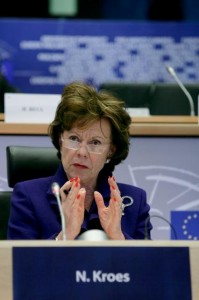August 10, 2014 – Europe
Neelie Kroes, Dutch born Vice President of the EU Commission of Digital Agenda for Europe, strongly criticized Hungary in her July 28, 2014 blog titled,
“Media freedom remains under threat in Hungary”
In it she stated,
“The Hungarian Government does not want a neutral, foreign-owned broadcaster in Hungary; it is using an unfair tax to wipe out democratic safeguards, and see off a perceived challenge to its power.”
Three years earlier, Germany’s European Journal featured a video segment on August 06, 2011 titled “Hungarian media law results in cuts to the public broadcast.”
It reported that more than 500 journalists had lost their jobs.
At the time the European Journal said,
“Condemnation from around the EU seems to have had little effect.”
And Hungary’s second most popular political party is influencing other far-right groups. An April 9, 2014 Business Insider headline warned,
“Hungary’s Anti-Semitic Jobbik Party Is Spreading Across Eastern Europe”
According to Business Insider,
“Far-right groups have emerged or grown stronger across Europe in the wake of the financial crisis, and they are increasingly sharing ideas and tactics. Reuters has found ties between at least half a dozen of the groups in Europe’s ex-Communist east. At the network’s heart, officials from those groups say, sits Jobbik.”
Hungary was an integral part of the Hapsburg’s Austro-Hungarian Empire prior to its break up at the end of World War One.
According to the Internet site titled the Official Website of the Almanach de Saxe Gotha,
“The House of Habsburg or Hapsburg (also known as House of Austria) was one the most important royal houses of Europe and is best known for being an origin of all of the formally elected Holy Roman Emperors between 1438 and 1740 … ”
Read the Jobbik Party article here
Read about the Habsburg Dynasty here
